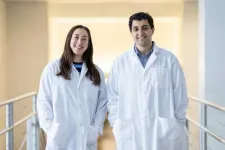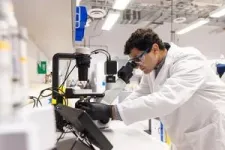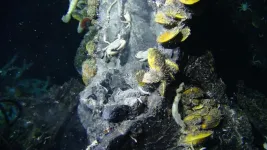(Press-News.org) In his Value Creation project in Cell Ag class, Tufts senior Adham Ali faced an intriguing assignment: work with a group of peers to design a product that uses cellular agriculture (or cell ag, for short) to make life easier for consumers.
Majoring in biochemistry, Ali took the class as part of his minor in cell ag—a minor he registered for only this semester, because it’s brand-new at Tufts.
It’s also the world’s first and only undergraduate degree in the field.
Usually used as part of a nascent—and rapidly growing—field that cultivates lab-grown meat from cells in bioreactors, the processes of cellular agriculture can be applied to non-meat products. In the class, students used design principles to create cell-ag solutions to problems. “It was incredibly eye-opening, and it changed the way I think about research,” says Ali.
The product he and his group designed? An endless essential oil diffuser. “You would put your diffuser in the house and the cells would keep growing to create essential oils that make your house smell better,” he says. “You’d never have to go to the store for essential oils again.”
A First-Ever Opportunity
Like Ali, senior Olivia Calkins registered for the minor at the start of this semester. A chemical engineering major, Calkins always knew she wanted a career dedicated to helping animals and the environment.
“I first discovered cell ag on my first day of freshman year, and I knew right away it’s what I want to do with the rest of my life,” says Calkins. “This is my dream. I started becoming involved in the Kaplan Lab, doing everything I could to immerse myself in the field. But it wasn’t until now that I could actually get a degree in it. I’m so excited about that—it’s a huge stepping stone for cell ag.”
David Kaplan, Stern Family Professor in the Department of Biomedical Engineering and executive director of the Tufts University Center for Cellular Agriculture (TUCCA), agrees. The new minor is a vital step toward securing the future of cellular agriculture, according to Kaplan.
“Graduate students have had the opportunity to contribute to research and industry aims in cellular agriculture for a while now,” says Kaplan. “But while we’ve offered classes to undergraduates and welcomed them into the lab, ours is now the first program that allows them to graduate with an actual degree in the field.”
“Now we’ll have the chance to guide and collaborate with students who have an interest in cell ag from their earliest days at Tufts,” he says. “Eventually, they’ll enter the field as professionals with a deep background and years of engagement in the subject.”
Preparing Students to Be Pioneers
The minor in cellular agriculture has been designed to provide undergraduates with the opportunity to advance tissue engineering research and to translate cellular agriculture research into food industry innovation. A convergence of many disciplines, the minor is available to students in either Tufts School of Engineering or the School of Arts and Sciences.
Students who register for the minor take six classes in the subject, including two core courses, a research project course, and three elective courses. Electives include offerings such as Food, Nutrition, and Culture; Food Systems: From Farm to Table; and Bringing Products to Market.
As seniors, both Ali and Calkins fulfilled the requirements for the minor before the minor even existed. That was, according to Calkins, a happy coincidence— “purely the result of curiosity and love for the subject,” as she puts it. Both students also took advantage of opportunities to conduct their own research in the Kaplan Lab and as well as summer internships that exposed them to aspects of the industry.
In addition, they co-founded the Tufts chapter of the Alt Protein Project, a global initiative by the Good Food Institute to increase university engagement in the field of alternative protein sources. Now, while also working on senior thesis projects, they are in the process of planning a Spring 2024 research conference open to students at all universities in the area, with the aim of increasing awareness of opportunities in the field.
And what’s next? After graduation, Calkins will go to work for a Boston-based company that makes bioreactors for cultivated meat. Ali aims to pursue an MD/Ph.D. degree, with the goal of becoming an expert in the area where knowledge about cellular agriculture overlaps with medical practice.
“No matter what,” Ali says, “I want to figure out how whatever I end up doing can be applied to cellular agriculture.”
END
What is Cellular Agriculture? The world population is expected to reach 9.7 billion by 2050. With it will come a doubling in the amount of animal protein we consume.
Tufts launches the world’s first undergraduate degree in cellular agriculture—a minor that allows students to take a deep dive into the groundbreaking field
2023-11-30
ELSE PRESS RELEASES FROM THIS DATE:
Scientists create framework to guide development and assessment of urban climate action plans
2023-11-30
With the world projected to be highly urbanized by 2050, cities are encouraged to take urgent climate actions to mitigate and adapt to the threats of climate change. As climate change intensifies and urbanization increases rapidly, local governments are expected now more than ever to lead climate action planning. However, studies show the limitations of the existing climate action plans (CAPs). So scientists from Hiroshima University have created an Urban Climate Action Planning (UCAP) framework to guide the development of urban CAPs and support the assessment of the level of suitability of these plans.
Their work is published ...
A new bacterial species from a hydrothermal vent throws light on their evolution
2023-11-30
A new bacterial species discovered at the deep-sea hydrothermal vent site ‘Crab Spa’ provides a deeper understanding of bacterial evolution.
Deep-sea hydrothermal vents are hot springs on the ocean floor. Sea water penetrates into the ocean crust, becomes heated, and rises to the seafloor surface carrying dissolved nutrients. Around these vents, far from any sunlight, vibrant biological communities are found. Here, microbes play the role of primary producers through chemosynthesis—similar to the role that plants play on land through photosynthesis.
Researchers at Hokkaido University, in collaboration with colleagues at Woods ...
UTA student earns prestigious award for drug-resistant antibiotic research
2023-11-30
A senior biology student at The University of Texas at Arlington recently earned an award for her research about antimicrobial drug resistance.
Christina Nguyen received the second-place award at the 2023 UT System LSAMP (Louis Stokes Alliance for Minority Participation) Conference held in El Paso, Texas. Nguyen’s award-winning project focused on bacteria that are resistant to antibiotics, an increasingly challenging problem in health care.
“I had the privilege of hearing multiple fascinating ...
Social media posts that promote tobacco are increasing, AI detection technology finds
2023-11-30
When teenagers and young adults see pro-tobacco content on social media, they face higher risks. They are more likely to report using tobacco products such as e-cigarettes (also called vapes), more likely to start using those products for the first time and less likely to view them as harmful. Algorithms programmed to automatically remove tobacco ads are designed to protect youth—but they don’t always work or are not implemented well enough by social media platforms, according to Julia Vassey, MPH, a health behavior researcher in the department of population ...
Identifying Australia's most elusive birds
2023-11-30
University of Queensland scientists have analysed more than 3.8 million volunteer hours of birdwatching data to identify Australia’s most elusive species.
Louis Backstrom from UQ’s School of the Environment led the research and said the Coxen’s fig-parrot was the bird that was most elusive to Australian birdwatchers, based on the data found in the eBird and Birdata databases.
“Coxen’s fig-parrots are small, dumpy, green parrots with very short tails, and historically they were scattered in rainforests between Bundaberg in Queensland and the Hastings River in New South Wales,” Mr ...
Air pollution from fossil fuel use accounts for over 5 million extra deaths a year
2023-11-30
Air pollution from using fossil fuels in industry, power generation, and transportation accounts for 5.1 million extra deaths a year worldwide, finds a new modelling study published by The BMJ today.
This equates to 61% of a total estimated 8.3 million deaths worldwide due to ambient (outdoor) air pollution from all sources in 2019, which could potentially be avoided by replacing fossil fuels with clean, renewable energy sources.
These new estimates of fossil fuel-related deaths are larger than most previously reported values ...
Social media use linked to risky health behaviors in young people
2023-11-30
Social media use is associated with risky health behaviours in young people including increased alcohol, drug and tobacco use, anti-social behaviour, risky sexual behaviours and gambling, finds a review of the latest evidence published by The BMJ today.
Exposure to risky health behaviour content on social media such as alcohol advertising had the strongest evidence of harm, particularly in relation to alcohol use and unhealthy eating.
The researchers say further research is needed to establish causality, understand effects on ...
Actively monitoring cervical lesions linked to heightened long term risk of cervical cancer
2023-11-30
Actively monitoring abnormal cells (lesions) that line the cervix rather than removing them straight away is associated with an increased long term risk of cervical cancer, suggests a study published by The BMJ today.
The researchers stress that the absolute risk of cervical cancer remains low, but the results show that compared with immediate treatment, active surveillance was associated with a nearly fourfold higher risk of cervical cancer 20 years after diagnosis.
Cervical intraepithelial neoplasia (CIN) refers to abnormal changes of the cells that line the cervix. CIN is divided into grades - CIN1, 2 or 3. The higher the number, ...
Internet is fuelling new wave of misogyny, says linguistics expert
2023-11-30
Society has gone backwards in its treatment of women with the internet fuelling new forms of misogyny, according to the author of a new book.
Linguist and researcher Deborah Cameron says that prejudice, discrimination and abuse should not be regarded as yesterday’s problems. Rather than fading away in the twenty-first century, they have evolved in ways that reflect today’s conditions, her research suggests.
Her book Language, Sexism and Misogyny analyses the way sexism and misogyny are expressed today in advertising and media, drawing on evidence from academic research to provide a comprehensive ...
World’s largest genetic project opens the door to new era for treatments and cures: UK Biobank’s major milestone
2023-11-30
In a momentous landmark for medical research, UK Biobank has today [Thursday 30 November] unveiled incredible new data from whole genome sequencing1 of its half a million2 participants. This is set to drive the discovery of new diagnostics, treatments and cures and, uniquely, is available to approved researchers worldwide, via a protected database containing only de-identified data (e.g. name, address, date of birth, name of GP and more stripped out). This abundance of genomic data is unparalleled, but what cements it as a defining moment for ...
LAST 30 PRESS RELEASES:
New study reveals how a key receptor tells apart two nearly identical drug molecules
Parkinson’s disease triggers a hidden shift in how the body produces energy
Eleven genetic variants affect gut microbiome
Study creates most precise map yet of agricultural emissions, charts path to reduce hotspots
When heat flows like water
Study confirms Arctic peatlands are expanding
KRICT develops microfluidic chip for one-step detection of PFAs and other pollutants
How much can an autonomous robotic arm feel like part of the body
Cell and gene therapy across 35 years
Rapid microwave method creates high performance carbon material for carbon dioxide capture
New fluorescent strategy could unlock the hidden life cycle of microplastics inside living organisms
HKUST develops novel calcium-ion battery technology enhancing energy storage efficiency and sustainability
High-risk pregnancy specialists present research on AI models that could predict pregnancy complications
Academic pressure linked to increased risk of depression risk in teens
Beyond the Fitbit: Why your next health tracker might be a button on your shirt
UCSB scientists bottle the sun with liquid battery
Lung cancer drug offers a surprising new treatment against ovarian cancer
When consent meets reality: How young men navigate intimacy
Siemens Healthineers and Mayo Clinic expand strategic collaboration to enhance patient care through advanced technology
Physicists develop new protocol for building photonic graph states
OHSU-led research initiative examines supervised psilocybin
New review identifies pathways for managing PFAS waste in semiconductor manufacturing
New research finds state-level abortion restrictions associated with increased maternal deaths
New study assesses potential dust control options for Great Salt Lake
Science policy education should start on campus
Look again! Those wrinkly rocks may actually be a fossilized microbial community
Exposure to intense wildfire smoke during pregnancy may be linked to increased likelihood of autism
Children with Crohn’s have distinct gut bacteria from kids with other digestive disorders
Genomics offers a faster path to restoring the American chestnut
Caught in the act: Astronomers watch a vanishing star turn into a black hole
[Press-News.org] What is Cellular Agriculture? The world population is expected to reach 9.7 billion by 2050. With it will come a doubling in the amount of animal protein we consume.Tufts launches the world’s first undergraduate degree in cellular agriculture—a minor that allows students to take a deep dive into the groundbreaking field






